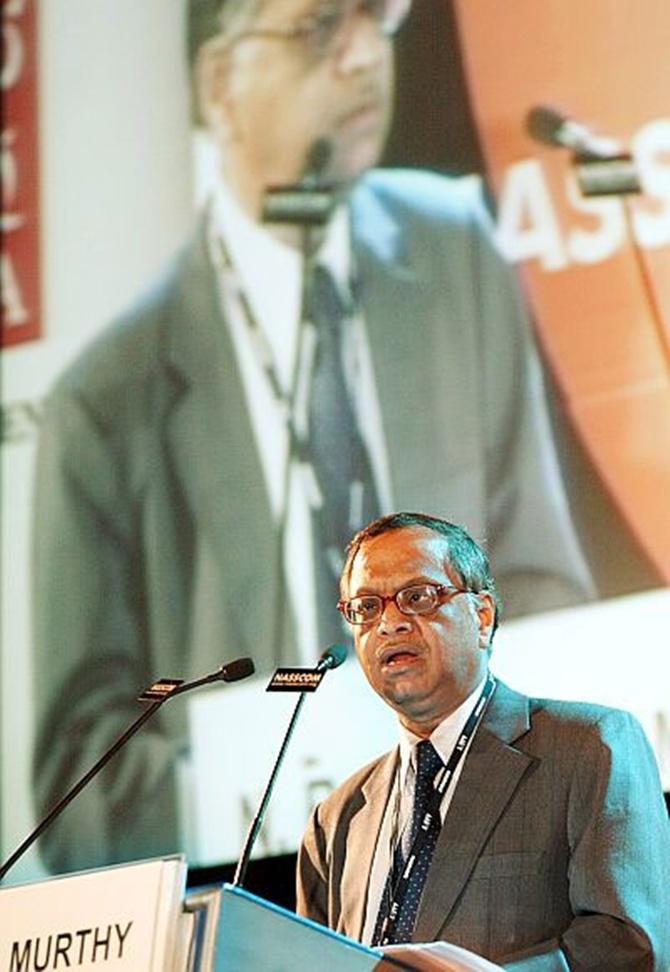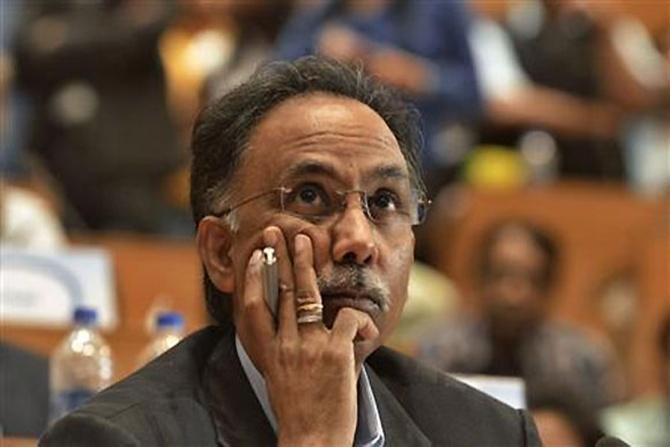
Key-man risk, nepotism, lack of leadership were terms that wouldn't be associated with Infosys in the past, notes Shriram Subramanian
If all Indian companies were subject to the level of scrutiny that Infosys undergoes by media and analysts, the Indian corporate governance landscape would be much more rosy.
Media and analysts do not even note that India’s largest listed real estate developer has made it possible to unilaterally give lifetime pensions to its directors at a time when the company has a stressed balance sheet and is trying to sell assets.
On the contrary, Infosys, which for long has been the paragon of corporate governance in India, is subject to greater scrutiny, bordering on speculation.
. . .

However, this scrutiny of Infosys may not be entirely unjustified.
First, ever since the initial public offering in 1993, Infosys was the torchbearer of corporate governance in India and benefited tremendously from the goodwill it generated from various stakeholders -- investors, employees, customers and community.
Secondly, today Infosys’ free-float market capitalisation is one of the highest among India-listed companies.
This means that investors have invested more funds in Infosys than most other Indian companies.
Investors and analysts had rightly come to expect the best corporate governance from Infosys.
There are solid reasons recent observations at the company raise question marks about its adhering to corporate governance in spirit.
. . .

Rohan Murty, the son of the founder-chairman of the company was appointed as an executive assistant to the incoming executive chairman.
The appointment in June 2013, an act of nepotism, broke an oft-repeated statement by the company founders that their children would not aspire for roles within the company.
If news reports are to be believed, Rohan is now being projected as a vice-president of the company.
Such a move would change the chairman’s stand that Rohan doesn’t aspire for senior leadership positions in the company.
This casts doubts on the credibility of any statements made by the company and its chairman.
Any appointment should be commensurate with the experience and expertise of the individual, and any fast-tracking without proper grooming would cast serious doubts on the founder-chairman’s intentions and the company’s governance standards.
. . .

The recent resignations by a few senior executives, including that of Ashok Vemuri, a potential chief executive officer, shouldn’t be seen as alarming.
Talent retention is an important aspect of leadership development but it isn’t that half of Infosys’ senior management is walking out of the company.
What is more alarming is that S D Shibulal, the current managing director and CEO, continues to function while, by bringing back N R Narayana Murthy as an executive chairman there was a show of no-confidence in Shibulal’s leadership by the board of directors.
Infosys needed some inspired leadership, and the current CEO didn’t provide it. Shibulal had a fantastic performance record but wasn’t the right fit for the CEO role.
The company suffered under the wrong CEO.
That Infosys chose to bring a person out of retirement as the executive chairman to reenergise the company showed that there was either a dearth of leadership within the company or the board of directors didn’t have confidence in other senior executives to take over as a CEO.
. . .

The board of directors, as trustees of shareholders, are responsible for securing the company’s current and future leadership.
The board of directors needs to set the ball rolling on two counts.
The first is to convey to investors as to how they are mitigating key-man risk, the second being a succession plan for the current CEO.
Both issues can be addressed only by putting in place and articulating a strong leadership development plan.
By being silent and non-transparent about the leadership programme, the company is only fuelling speculation.
Any board’s charter is to ensure proper risk management.
The Infosys board of directors needs to allay fears that the company today suffers from a key-man risk.
. . .

No company, especially the size of Infosys, can be a single person’s making. Infosys badly needed a no-nonsense, strong leader who leads by example.
The company got one when Narayana Murthy returned in June 2013.
But now is the time to think beyond and prepare for the future.
Leadership succession plans should consider not only planned transitions but also unplanned ones.
Succession planning for the new CEO should begin in right earnest.
The board of directors needs to announce the appointment of a committee headed by an independent director to find a successor for the current managing director and CEO.
The new candidate may well be an outsider.
The process and the timelines should be announced.
. . .

A smooth transition to a new CEO would do the company a lot of good.
The board should select a CEO who is capable of identifying current challenges and those that lie ahead.
The CEO should possess qualities that position the company for navigating the challenges successfully.
To reassure investors, Infosys should also make the leadership development plan within the company more transparent.
The company is only as good as its people, being its greatest assets.
The company should tell investors what measures are being taken, and what investments are being made, to ensure that there is a strong leadership development programme in place and the company wouldn’t be floundering for leaders in future.
Key-man risk, nepotism, lack of leadership, ineffective CEO were terms that wouldn’t be associated with the Infosys corporate governance practices in past.
It is time the company reclaimed its gold standard in Indian corporate governance.
Shriram Subramanian is founder and managing director of InGovern Research Services, India’s first corporate governance research firm